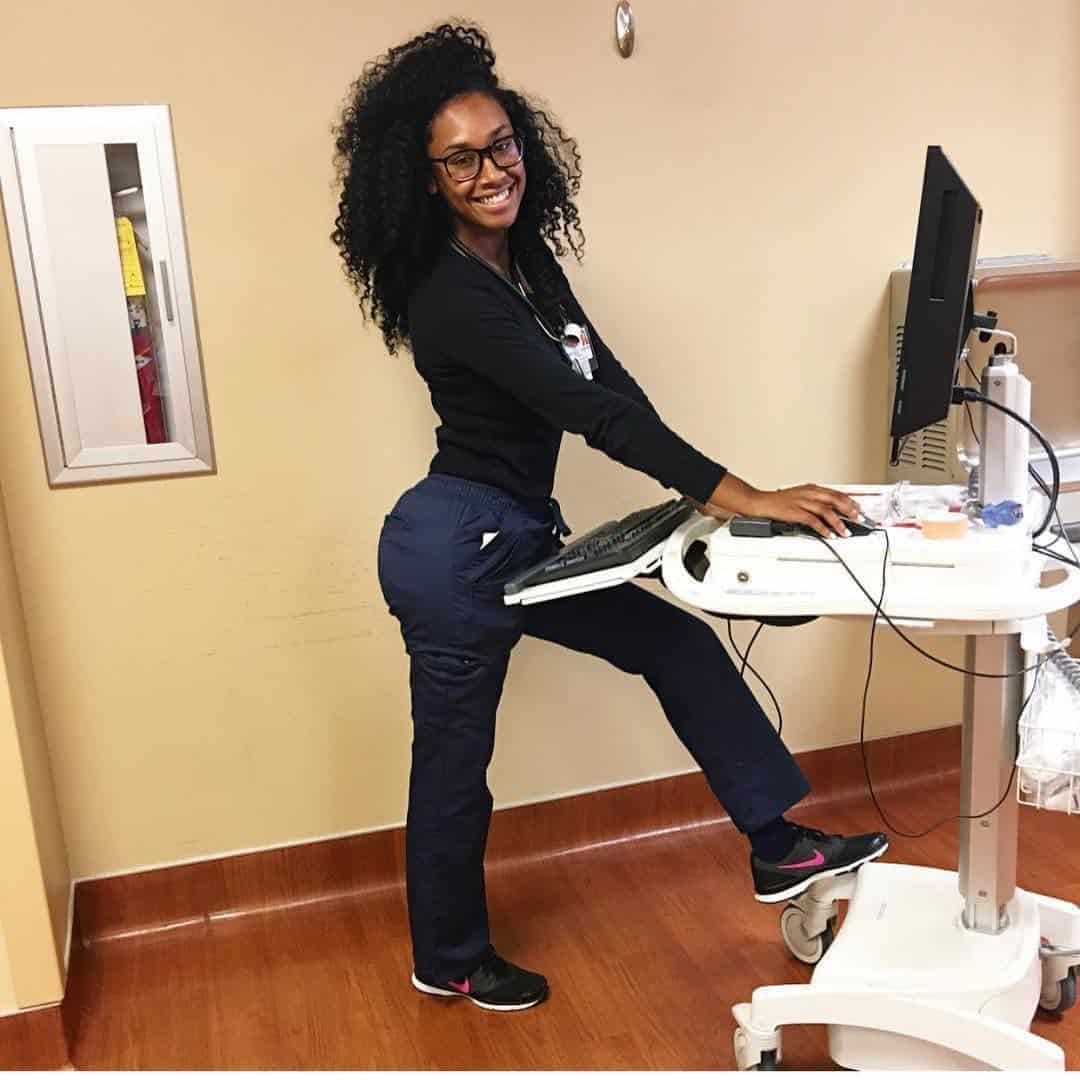A registered nurse is a healthcare professional who treats patients, offers medical advice, and provides emotional support to them and their families.
A registered nurse can also be defined as a nurse who has completed a nursing program and satisfies the requirements specified by a country, state, province, or a similar government-authorized licensing body to attain a nursing license.
A registered nurse’s practice range is decided by legislation and is regulated by a professional body or council. Some of them enlighten patients, as well as the general public, about medical conditions. Several available nursing specializations areas include critical care, addiction, oncology, neonatology, geriatrics, and pediatrics.
Some registered nurses function in more than one specialty, such as pediatric oncology. There are also registered nurses who provide generic or specialized care to patients. There are clinical nurse specialists, nurse practitioners, and nurse-midwives.
In 2016, there were about 3 million registered nurses working in the US. They may also be responsible for monitoring care delivered by other healthcare workers, including student nurses, licensed practical nurses (except in Canada), unlicensed assistive personnel, and less-experienced RNs.
Registered nurses must typically satisfy a minimum practice hours requirement and undergo continuing education to maintain their license. Additionally, there is frequently a requirement that a registered nurse maintains a clean criminal record free.
History of registered nurses

Nursing registration by nursing councils or boards started with the emergence of the twentieth century. New Zealand holds the record for registering the first nurse in 1901 to establish the Nurses Registration Act. Nurses were mandated to finish three years of training and scale through a state-administered examination.
Registration maintained a degree of consistency in new nurses’ training, and the title was typically protected by law. After 1905 in California, it became an offense to claim to be a registered nurse without a certificate of registration.
Presently, the usual criteria for a registered nurse license in the United States include attaining either an associate degree (community college) or a baccalaureate degree (college or university) in nursing and scaling through an examination. Registration acts permit authorities a degree of control over who was admitted to the profession.
Requirements are different across various locations but often included a condition that the applicant must be “of good moral character” and must not possess mental or physical conditions that rendered them incapable of practicing.
Before the 1870s, many people were catered for at home by family members. The nursing profession’s standpoint started to shift as increasing medical advances were established during the end of the 19th century and leading into the beginning of the 20th century.
As the nursing profession became more internationally recognized, with registered nurses traveling to seek employment or enhanced working conditions and wages, some countries started carrying out standardized language tests. This was popularly known as the International English Language Testing System.
Duties & responsibilities of registered nurses
If you want to operate in this profession, you can expect always to perform some of the following tasks:
- Follow physicians’ orders, give medications, commence IVs, carry out treatments, procedures, and special tests. They are also responsible for documenting treatment demanded by the company’s policy and local/state/federal rules and regulations
- Order, interpret and assess diagnostic tests to recognize and evaluate the conditions of the patients
- Evaluate and determine the needs of patients for and reactions to care rendered
- Apply excellent nursing judgment in the management decisions pertaining to the care of patients
- Offer primary and emergency care for vocational and non-vocational injuries and ailments
- To give over-the-counter and prescription medications as instructed
- Partner with the nursing team to produce a Plan of Care for every patient
- Instruct and guide auxiliary staff and uphold standards of professional nursing.
Registered nurses are most often the key monitor of patients’ health via observing and evaluating their records, symptoms, and responses to treatment and care.
They frequently engage in extensive conversations with patients’ families and guide and advise them in aftercare measures. Their specific duties rely on the department they work in and the particular needs of the patients they provide care for.
Registered nurse remuneration
A registered nurse’s remuneration can differ on whether he/she is employed by a hospital, a private physician, the government, or a school.
According to the US Bureau Labour of Statistics in 2018:
- Median yearly salary: $71,730 ($34.48/hour)
- Top 10% yearly salary: more than $106,530 ($51.22/hour)
- Bottom 10% yearly salary: less than $50,800 ($24.42/hour)
Education or training & certification of registered nurses
The criteria for education and licensing can differ by state, but they are all subjected to these guidelines:
Education
You’ll require a bachelor of science degree in nursing (BSN), an associate degree in nursing (ADN), or a nursing diploma. Some colleges and universities offer BSN programs that usually last for four years. ADN programs are offered at some community and junior colleges.
The ADN programs take two to three years to complete. Diploma programs generally take three years to complete and are administered by hospitals. They are somewhat rare in comparison to the availability of BSN and ADN programs.
Licensing
Irrespective of the state where you want to practice, you must have completed a program that has attained accreditation by the Accreditation Commission for Education in Nursing (ACEN) or the Commission on Collegiate Nursing Education (CCNE).
Every state requires graduates of accredited nursing programs to scale through a national licensing exam, the National Council Licensure Examination-RN, or NCLEX-RN, administered by the National Council of State Boards of Nursing ( NCSBN).
Skills of registered nurses

You’ll require the following skills and personal qualities to excel in this profession:
- Empathy: You must be capable of feeling and showing concern for the welfare of others
- Organizational skills and attention to detail: You must be well organized and detail-oriented because this will aid you to adhere to every procedure accurately and ensure the safety of yourself, your patients, and your coworkers
- Critical thinking ability: The ability to think critically will enable you to assess problems and implement the necessary actions to rectify them
- Emotional stability and patience: These two qualities will aid you in dealing with challenging circumstances that usually occur in this field
- Listening and speaking ability: You must know how to communicate effectively with patients and your colleagues. You should be capable of partnering with team members
- Sound bedside manner: This goes in perfect synergy with empathy and communication skills
- Ability to be discreet: You must be capable of sustaining a high level of confidentiality about health service records and information
- Multitasking: You should be able to carry out several tasks simultaneously and without making a mistake.
Profession’s outlook
According to the United States Bureau of Labour Statistics speculations, registered nurses can anticipate an excellent job outlook. This governmental institution labels nursing as a “Bright Outlook” profession because it is expected to progress much quicker than the median for all professions between 2016 and 2026, by a growth margin of about 15%.
Furthermore, an increase in the establishment of outpatient care centers is expected during this period, which means more employment opportunities.
Work environment
Above 60% of all registered nurses were recruited by hospitals in 2016. Others were employed in doctor’s offices, outpatient facilities, and nursing care facilities. Still, home health care services, schools, and correctional facilities made up for the other employers of nurses.
While registered nurses are highly sought after and are well remunerated, there are some opposing sides to nursing. Like all healthcare professionals, registered nurses can be prone to contagious diseases because they provide hands-on care.
They are also vulnerable to sustaining injuries from the physical activity of lifting and transporting patients. They must be careful to adhere to procedures that cushion these risks.
Registered nurses’ work schedule
Registered nurses must be flexible and capable of working irregular schedules. This includes working on weekends and holidays due to staffing and census alternations. Those recruited in hospitals and nursing care facilities usually operate round the clock, generally on revolving shifts.
They are very likely to also be on call when they’re not on duty. They must be ready and able to resume work on impromptu notice in emergencies. Nurses who operate in physicians’ offices and schools are likely to have a much more regular work schedule.
Benefits of nursing
When attaining a nursing degree, there are personal benefits attached. A personal benefit is that nursing is a highly prestigious position. Another merit is the sufficiency of employment opportunities.
This is because nurses are highly sought after. The nursing profession also offers an assortment of employment possibilities because, with a nursing degree, there are many job positions notched under this category.
Exploring several options offers someone the opportunity to find the job that suits them the most. Patients enjoy the benefit of having enough nurses to satisfy the needs of the clinic or hospital. An increasing number of nurses translates to a higher quality of life for the patients in their care.
Economics of the nursing profession
In the year 2011, there were 2.24 million registered nurses in China. In 2014, the United States had roughly 2.7 million registered nurses, and Canada well over 250,000. This works out to about eight nurses per 1,000 people in the US and Canada.
The increasing rate in the United States is because of several reasons, including an improved interest in preventative care, the rise in the rate of chronic illnesses, and the requirements of services needed by the baby boom generation. The highest-paid registered nurses in the US are in California.
California cities frequently make up the top five highest-paying metropolitan territories for registered nurses in the country. The majority of registered nurses begin working with competitive salaries.

An overview of the nursing profession in selected countries
Nursing in Australia
Since 2010, nursing registration in Australia has hit a national level. The Nursing and Midwifery Board of Australia (NMBA) institution comprises the Australian Health Practitioners Regulation Agency (AHPRA). Before 2010, Nursing registration in Australia was carried out independently by each state and territory.
The title ‘Registered Nurse’ is granted to a nurse who has concluded a board-approved course in the discipline of nursing, as stated by training and registration standards outlined by the NMBA.
Registered nurses are also mandated to satisfy other specific standards to meet registration standards as stated by the NMBA. These can include continuous professional advancement, recency of practice, background checks on criminal history, and fluency in English.
Nursing in Canada
In every Canadian province except Quebec, recently registered nurses are mandated to attain a Bachelor of Science in Nursing. This is either obtained via completing a four-year university program or through a bridging course for registered practical nurses or licensed practical nurses.
Some universities also provide condensed programs for applicants that are already holders of a bachelor’s degree in another field. Before 2015, the first licensure as a registered nurse mandated scaling through the Canadian Registered Nurse Examination (CRNE) provided by the Canadian Nurses Association.
In 2015, for initial licensure, registered nurses in Canada were required to pass the NCLEX-RN exam offered by the National Council of State Boards of Nursing.
Nursing in the USA
A registered nurse is a professional clinician in the US who has concluded a minimum of an associate degree in nursing or a hospital-based diploma program. Then proceeds to complete the NCLEX-RN examination for initial licensure successfully. Other qualifications differ by state.
Additional information about the NCLEX-RN examination and certain state nursing boards is offered by the National Council of State Boards of Nursing. Although Associate degree programs typically last for two years, Associate of Science in Nursing (ASN) degrees usually take three years to conclude.
This is due to the enhanced volume of undergraduate course-load connected to the nursing profession, often as part of the program itself and, in some cases, as prerequisites for admission.
Bachelor of Science in Nursing (BSN) degrees include more comprehensive coursework in leadership and community health and increased clinical hours. It can be concluded as a sequel of an Associate program or independently.
Faster versions of both programs are available and are regarded as specifically challenging because of the heightened coursework required to finish the program in a short time.
Some employers, particularly hospitals, may need a bachelor’s degree even for entry-level positions. However, it is also more common for hospitals to recruit ASN-licensed individuals for restricted practice, under the stipulation that the nurse concludes a BSN within a specific time-frame, usually 2-3 years.
Specialty certification is offered through organizations such as the American Nurses Credentialing Center, which is part of the American Nurses Association. After satisfying the eligibility requirements and passing the appropriate specialty certification exam, the designation of Registered Nurse – Board Certified (RN-BC) credential is granted.
In some states, the law permit nurses with higher-level degrees such as Masters of Science in Nursing (MSN) or Doctor of Nursing Practice (DNP), to work with enhanced autonomy, enabling them to practice medicine with limits, often including even the prescription of medication without the official supervision of a licensed physician (MD or DO).
However, some advanced nursing degree programs are adequately specialized for jobs within a hospital setting (for instance, Nurse Anesthetist); that it is unusual for such nurses to run an independent medical practice.
Nursing in Hong Kong
In Hong Kong, applicants for the profession must conclude a pre-registration nursing program that will last not less than 3 years to enroll as registered nurses. In Hong Kong, foreign applicants must possess a practicing certificate acknowledged by the Nursing Council of Hong Kong and scale through the Licensing Examination for Registration.












